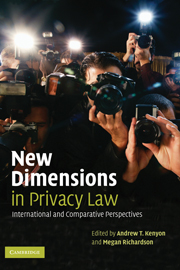Book contents
- Frontmatter
- Contents
- List of contributors
- Preface
- 1 New dimensions in privacy: Communications technologies, media practices and law
- 2 Privacy and freedom of speech
- 3 Revisiting the American action for public disclosure of private facts
- 4 The internet and private life in Europe: Risks and aspirations
- 5 APEC's privacy framework sets a new low standard for the Asia-Pacific
- 6 Copyright, privacy and digital rights management (DRM)
- 7 Why there will never be an English common law privacy tort
- 8 The ‘right’ of privacy in England and Strasbourg compared
- 9 Privacy and constitutions
- 10 Celebrity privacy and benefits of simple history
- Bibliography
- Index
- Index of laws and directives
- Index of case references
1 - New dimensions in privacy: Communications technologies, media practices and law
Published online by Cambridge University Press: 24 July 2009
- Frontmatter
- Contents
- List of contributors
- Preface
- 1 New dimensions in privacy: Communications technologies, media practices and law
- 2 Privacy and freedom of speech
- 3 Revisiting the American action for public disclosure of private facts
- 4 The internet and private life in Europe: Risks and aspirations
- 5 APEC's privacy framework sets a new low standard for the Asia-Pacific
- 6 Copyright, privacy and digital rights management (DRM)
- 7 Why there will never be an English common law privacy tort
- 8 The ‘right’ of privacy in England and Strasbourg compared
- 9 Privacy and constitutions
- 10 Celebrity privacy and benefits of simple history
- Bibliography
- Index
- Index of laws and directives
- Index of case references
Summary
While the idea of ‘privacy’ is venerable, modern obsessions with privacy are largely rooted in the twentieth century, particularly the years following the Second World War. The precise reasons may vary and change over time. As any European civilian lawyer will confirm, the European Convention on Human Rights, with its important provision for security of private life alongside its protection of freedom of expression, was a direct response to the many and varied intrusions on personal integrity that occurred during the war years. In Europe it still represents a bulwark against organised authority, and significantly not only one limited to the authority of the state.
An American lawyer would almost certainly refer to the paradigmatic work of Warren and Brandeis, which preceded the twentieth century by only a few years, and its later revision by Prosser. However, such a lawyer might well add that the human rights movement of the 1960s and 1970s really established the modern conception of rights as basic to a democratic polity in the United States – even if it was free speech rather than privacy that emerged as dominant. The rights had to contend for success in America's so-called ‘marketplace of ideas’, and the competition was prefigured by the First Amendment's explicit reference to freedom of expression as a basic American value and the interpretation of that constitutional wording by courts, particularly since the 1960s. Here at least there is some basis for difference with the rest of the world.
- Type
- Chapter
- Information
- New Dimensions in Privacy LawInternational and Comparative Perspectives, pp. 1 - 10Publisher: Cambridge University PressPrint publication year: 2006
- 2
- Cited by



